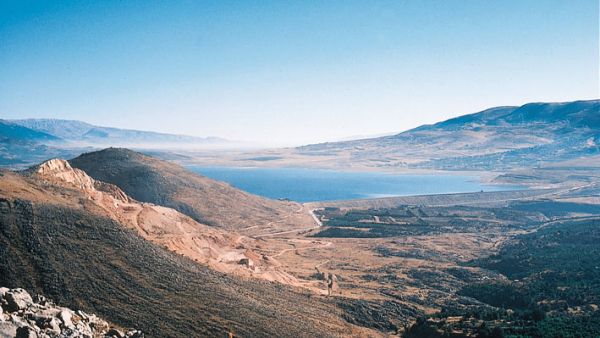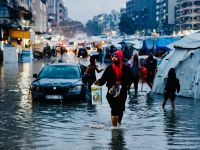Lebanon’s Finance Ministry Friday signed a $55 million loan agreement with the World Bank to reduce pollution flowing into the Qaraoun Lake in the Bekaa Valley.
“We are witnessing today the signature of one of the most important agreements with the World Bank aiming to reduce pollution flowing to Qaraoun Lake, which constitutes the biggest source of water for Lebanon,” Finance Minister Ali Hasan Khalil proclaimed during the signing ceremony.
Such agreements must be ratified by the Cabinet and Parliament.
Khalil said that the project relates to the work of the Environment, Energy and Agriculture ministries.
“The project, which is common among various ministries, aims at reducing the quantity of untreated municipal sewage discharged into the Litani River and improving pollution management around Qaraoun Lake,” he said.
Khalil said in his remarks that the new project will serve around 350,000 people who make up 7 percent of the Lebanese population while indirect beneficiaries from the project would reach 800,000, constituting 18 percent of the population.
He added that the most important constituent of the project is that it will improve sewage networks in Zahle, Anjar and Aitanit.
Maria Sarraf, World Bank lead environment specialist and project team leader, explained that the project “will construct sewage networks and connect them to wastewater treatment plants [such as Zahle] so that sewage gets treated before it is discharged in the Litani River.”
“That way, not only we reduce the pollution entering the river but make treated water available for irrigation,” she said.
Khalil said the project was one of many that are about to be launched with the World Bank in a bid to support the country’s infrastructure to face the challenges of Syrian refugees in Lebanon. “We are keen on cooperating with the World Bank on new projects that would serve the interests of this country,” he said.
For his part, Ferid Belhaj, World Bank Director for the Middle East, said that he had discussed in July at the World Bank’s headquarters in Washington a strategy for cooperation with Lebanon aimed at supporting development in the country including the construction of a dam in the Jezzine town of Bisri.
Belhaj added that the World Bank is also keen on supporting Lebanon in areas that would minimize the repercussions of the Syrian crisis on Lebanon such as education, municipalities and health.
Likewise, Khalil said that the Finance Ministry would soon sign a $100 million agreement with the World Bank focusing on the education sector.
From his side, the head of the Council for Development and Reconstruction, Nabil Jisr, said that negotiations are underway with the World Bank for the launching of two very important projects.
“The first aims at rehabilitating roads at $200 million while the second is related to rapid transport and it costs $250 million,” he said. “The Japanese will contribute $100 million in the roads rehabilitation project.”








